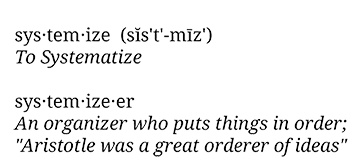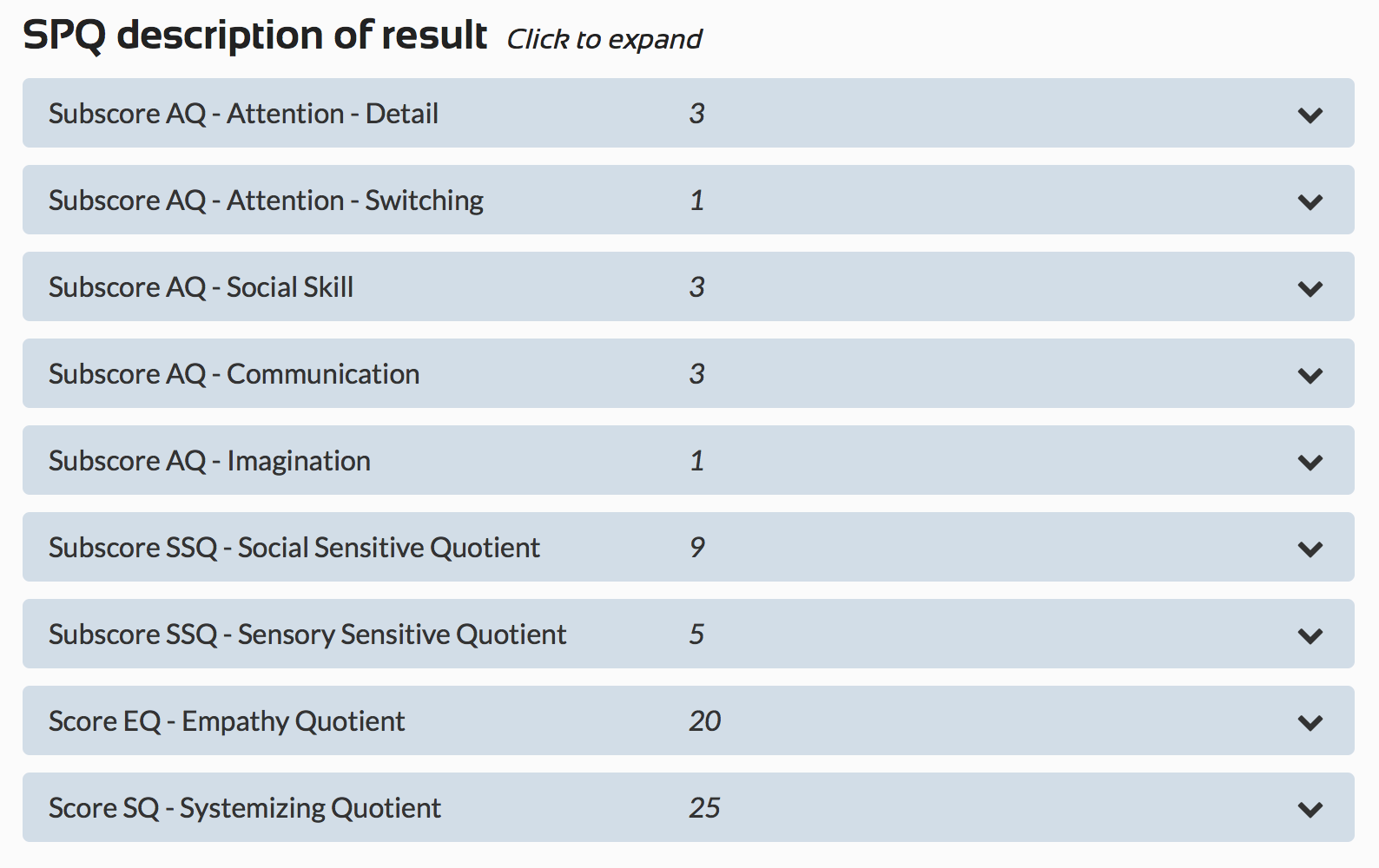Do you have a Systemizer profile?
 It’s not a question about being right! You know you are! You often find that you can see the solution to challenges and issues before most others, but can still find it hard to explain your thoughts and concepts to your collaborators, because not everyone has the skills you have.
It’s not a question about being right! You know you are! You often find that you can see the solution to challenges and issues before most others, but can still find it hard to explain your thoughts and concepts to your collaborators, because not everyone has the skills you have.
You are the type who best likes to express yourself directly because it is simply the easiest way to help those around you do a better job, but it also means that others may feel threatened by your expertise and see you as critical, unempathetic and even uncooperative, even if you were just trying to contribute to the common good.
Perhaps you have taken a number of courses that focus on empathy, interpersonal skills, team spirit, team building, conflict resolution and leadership training. Or you have regular conversations with management to try to be a little more open and flexible and a bit less critical.
If you recognise just a little of yourself in this presentation, we can help you develop your strengths, so that others can also be included.
You may work in areas that require a high degree of technical specialisation and are perhaps a lawyer, engineer, programmer, researcher, doctor or scientist. Or you work in the creative field of music and may be an artist, musician, designer, journalist, architect, photographer or lecturer. Maybe you work with information processing or linguistics and creative representations of concepts.
Where does the Systemizer concept come from?

The American Heritage Dictionary of the English Language
“Systemizing is the need to analyse the different variables in a system, a need to infer the underlying rules that govern a system’s behaviour. Systemizing also refers to the need to construct systems. Systemizing allows you to predict system behaviour and allows you to control it.”
Quote from Simon Baron-Cohen,
Professor Cambridge University
General information about individuals with a Systemizer profile
There are two main groups of people with a Systemizer profile. One group invents and develops new systems, the second group maintains and develops existing systems. Both groups are characterised in that they look for patterns and connections and have a sense of how something new or something existing could be seen. Both groups are system thinkers and have a high degree of specialised knowledge and skills, which they use to succeed professionally or in their spare time.
Individuals with a Systemizer profile are characterised by a higher level of creativity, innovation, organisational talent or “out of the box thinking” than average. We find those with a Systemizer profile in many different professions where there is a need for a high level of ability to process, use and disseminate knowledge and data.
Those with a Systemizer profile, both privately and at work, look for patterns and connections in everything they do. They are not focused on the social context and rules of the game, but have a Systemizer approach to everything they do. They think in systems, even when it comes to social contexts.
People with a Systemizer profile typically have a lot of specialist knowledge in specific areas. They will mostly be experts and leaders in their field.

It can be difficult for those with a Systemizer profile to develop social relationships and thrive in social settings. This applies both at work and in their personal life. Those with a Systemizer profile can often be isolated at work and have difficulty understanding non-verbal communication, irony and why they hurt other people. Dishonesty or implied comments are not easy for those with a Systemizer profile to catch and they can end up becoming depressed because they cannot get their social life to function.
Those with a Systemizer profile may have difficulty communicating what they think, feel and believe in an easy and understandable way to others who do not have the same professionalism or expertise they do. The same is true when conflicts or situations that demand greater social empathy must be solved.
Sometimes those with a Systemizer profile are actually really good at networking and function fine in social contexts and make use of their empathy. For this type of individual with a Systemizer profile the challenge may be that they can become overloaded with empathic impression, without having an intuitive sense of how to deal with the social aftermath. You could say that some of those with a Systemizer profile do not have an empathy disorder, but rather trouble strategising in relation to handling the many emotional and social impressions that affect them in the workplace.
Those with a Systemizer profile build their lives around specific clear and firm habits and routines, both personally and at work. They are not very flexible when it comes to changing their already established ways of working or doing things.
Those with a Systemizer profile usually have relatively few, but very clear interests and hobbies that they put a lot of energy into.
Those with a Systemizer profile can, if they are seen and recognised for their strengths, contribute to a lot of new thinking and innovation in any area.
Strengths and challenges for people with a Systemizer profile

Most people in the population have a normal ability to be social, show empathy and solve various professional tasks.
Persons with a Systemizer profile often have a greater ability or desire to solve professional tasks and a lesser ability or desire to adapt socially than most people in the population.
This can be illustrated by Gauss’ population distribution curve.
Because of their different social and occupational profiles, some persons with a Systemizer profile see the workplace as a challenge. They can be vulnerable to stress, burnout, frequent job changes, divorce, ability to perform and they can feel isolated or bullied.
Employees with a Systemizer profile
 Parallel to most employees, there are a percentage of employees who possess specialist knowledge or who prefer tasks that must be solved individually. These employees will often have a Systemizer profile.
Parallel to most employees, there are a percentage of employees who possess specialist knowledge or who prefer tasks that must be solved individually. These employees will often have a Systemizer profile.
Individuals with a Systemizer profile are those characterised by a higher level of creativity, innovation, organisational talent or “out of the box thinking” than average and who can be challenging to work with or are themselves challenged professionally.
They often find their own way through systems. They are often direct in their professional messages, without considering how the recipients emotionally react to the message. A person with a Systemizer profile solves tasks in an intelligent way, which may not follow the usual instructions.
Those with a Systemizer profile may be attracted to repetitive work that is carried out through work routines, but can also be creative and spontaneous in their assigned tasks. For all such employees it applies that they want to have control over their work and need managers who support their work processes without interference. They simply make their own systems for almost all chores – socially, professionally, personally and relationally.
People with a Systemizer profile are important to the workplace
An important focus – which has long been ignored – is that some of the best and most innovative employees have a Systemizer profile.
They are valuable because they understand how to develop, innovate, optimise and invent new ways of doing things or they come up with an original point of view that perfectly solves a particular challenge. Their ability to see opportunities and solutions and the way they arrive at their results are simply original.
They are valuable because they produce results and work hard and purposefully to complete their tasks on time.
Persons with a Systemizer profile are important to invest in
 For a long time the focus has been on getting those with a Systemizer profile to fit into the workplace and – in many companies – a lot of negative energy has been spent to “keep track” of these employees or do “damage control” in the workplace because they do not play by the same rules as everyone else.
For a long time the focus has been on getting those with a Systemizer profile to fit into the workplace and – in many companies – a lot of negative energy has been spent to “keep track” of these employees or do “damage control” in the workplace because they do not play by the same rules as everyone else.
Imagine instead if the workplace was designed to better strengthen those with a Systemizer profile, while also using resources to train colleagues and departments so that employees with a Systemizer profile can thrive and use their skills optimally for the benefit of the company or organisation. This would have a very positive effect on the company’s work environment and overall performance.
As a company, it is about thinking: What can we do to create the best environment for our most creative, productive individuals with a Systemizer profile, so their energy is used to deliver results and not just survive in the workplace? What can we do so that colleagues of those with a Systemizer profile are prepared to cooperate or work in the same space as individuals with a Systemizer profile, with crisp and clear expectations of each other?
At Systemizer we offer various services that can help a workplace become a good space for both those with a Systemizer profile and all other employees.
Needs of employees with a Systemizer profile
A person with a Systemizer profile can experience stress at work if there are too many external demands for flexibility or external control. A person with a Systemizer profile thrives on being able to create a framework and set a goal and can then contribute individually developed input.
A person with a Systemizer profile can be temperamental and is often passionate in their professional identity, while they may seem a little socially backward or get close to pushing other people’s boundaries.
We find individuals with a Systemizer profile in all companies, in various departments and work areas. In a company consisting, for example, of sales, administration, development, programming, operation, maintenance, insurance, IT, HR etc., typically specific departments have people with a Systemizer profile as employees, or specific jobs in a general department.
Those with a Systemizer profile are often innovative in their approach to solving creative processes and have a touch of genius. But they can be challenged to participate in a collective process that requires a high degree of flexibility during development of a new product.
The employee group of any business consists of many different personalities. This creates diversity, providing strength and ballast to the whole.
A good framework for a person with Systemizer profile
 In many workplaces there are employees who in some way have a little more edge than most. As a manager it is important to get a group to operate dynamically and effectively, even if there are employees who have difficulty using empathy in practice, thus create situations of conflict.
In many workplaces there are employees who in some way have a little more edge than most. As a manager it is important to get a group to operate dynamically and effectively, even if there are employees who have difficulty using empathy in practice, thus create situations of conflict.
If this happens frequently the employee could have a Systemizer profile, where both the company and the employee would benefit from becoming aware of this so that the workplace can find a common language to manage potential conflicts in an effective and respectful way.
An individual with a Systemiser profile is typically characterised as technically gifted, innovative and creative, a word equilibrist, visionary, storyteller and detail-seeker who wants to help make the workplace into the best in the country. But who often has their own opinions on how this should be done and who may find it difficult to engage in dialogue or compromise with others.
If someone criticises their lack of empathy, they are often hurt and it becomes very clear that they do not want to create these problems for themselves or others.
One dilemma may be that current coaching or development does not have the desired effect, and – as a manager may be forced to tell them no – sometimes with a problematic collaboration-based termination as the only way, although the cause is rarely due to lack of technical skills in the subject.
A person with a Systemizer profile needs to learn the social and psychological rules that other people understand intuitively. These explanations are based on a logical analysis of personality development with a focus on the employee’s personality profile. The focus is ensuring that the employee understands the connection between their own thinking and values and how a group of employees works dynamically and how they can contribute without necessarily wanting to control everything.
Are you a manager of a person with a Systemizer profile?
 You have repeatedly had good employees in your office who are very frustrated or sad. Too often you hear that they cannot work with a particular colleague because it is almost impossible to cooperate.
You have repeatedly had good employees in your office who are very frustrated or sad. Too often you hear that they cannot work with a particular colleague because it is almost impossible to cooperate.
You have tried many different solutions. You have moved the employee around, you have given them their own office, you have given them certain tasks they can solve by themselves so they need not collaborate too much with the others on the team. But nonetheless conflicts occur constantly and situations where you have to get involved. It is as if your employee cannot see the effect their words and actions have on other people and it creates particular challenges for you as a manager.
Training, coaching and more training, personal interviews and tips just have not worked as you had hoped, so now you do not quite know what to do. On the one hand it is almost too difficult to maintain this employee on the staff. On the other hand they consistently deliver results and there is an energy and wealth of ideas about them that is valuable and that you hate to do without. They simply have something that the others do not have.
It can also be a little fascinating to meet with this employee. The way they think, the ideas and innovation that happen, the aplomb and confidence in their ideas, is contagious. And often this is simple to understand and creates good results. But it is also a bit challenging because they are not really ready to listen to others and would like to have everyone go along with their idea.
If you recognise the description, then you might be the manager of someone with a Systemizer profile.
More about SPQ (Systemizer Profile Questionnaire)
The SPQ – Systemizer Profile Questionnaire – has been developed by Kirsten Callesen and Peter Dyhr, based on Professor Simon Baron-Cohen’s screening tools (AQ Asperger’s quotient, EQ Empathy quotient and SQ Systemizer quotient) as well as questions from the screening tools for detection related to sensory hypersensitivity.
The SPQ is a screening tool and can be used to make a personal profile
Having a Systemiser profile is not a diagnosis or disorder, but merely a narrative way to explain a particular way of functioning. If you are a health professional, you can use the SPQ to ascertain whether there are particular difficulties with functioning  in this way.
in this way.
Simon Baron-Cohen’s initial screening tools consist of AQ (50 questions), EQ (40 questions) and SQ (75 questions). Of these tools, we have included 20 questions from AQ, 20 questions from EQ and 25 questions from SQ (If you are an HR partner or professional, you can receive the exact questions we have taken from Baron-Cohen’s tests) and 20 questions on social and sensory sensitivity. The SPQ consists of 85 questions total.
Simon Baron-Cohen developed AQ with 5 subcategories (attention to detail, attention to change, social interaction, social communication and social imagination). These categories are also used in the SPQ.
The SPQ scores each question depending on how relevant it is in terms of being a person with a Systemizer profile. If you answer “Systemizer relevant” to a question, you get 1 or 2 points depending on how much you believe it is true or if you answer “Systemizer different”, you get 0 points for a question. The highest total score is 170 points.
 The total score is added up from several subcategories, as you can see from the example.
The total score is added up from several subcategories, as you can see from the example.
There are 9 subcategories in the SPQ and each subcategory is divided into three possible scores: a low, median or high score. This means that one can have a low
score in 3 out of 5 AQ subscores and a high score in 2 out of 5 AQ scores. Just as one can have a median score in the EQ section and high scores on the two sensory profile scores, as well as a median score in SQ. It is all completely dependent on what your subscores are, then you will have generated an individualreport that takes your profile into account in general. If you want a custom report with all the questions taken into account, your score must be manually processed, which can be done by contacting a Systemizer consultant.
Scoring of AQ section
There are four questions from each of the 5 subcategories from AQ (20 issues in all), meaning you can get up to 8 points for each subcategory, together providing up to 40 points. After taking the test you get an automatically generated report, taken from the individual scores of the subcategories. In Simon Baron-Cohen’s original AQ test, you got 1 point regardless of whether the answer fit a little or a lot and 0 points if the answer did not fit. In the SPQ we have weighted the answers to two points if the answer fits very well, 1 point if the answer fits somewhat and 0 points if the answer does not fit.
Scoring of AQ section
There are 2 sensory profiles within the SPQ. One we call Social Sensitive. It includes 10 questions that focus on the fact that a human being can be particularly sensitive to external interference by other people in their life, without this in itself involving problems with empathy or their ability to see another’s point of view. It is mostly that they become exhausted by too much social contact and need time to themselves. It is possible to be either introverted or extroverted while also being social sensory sensitive. The highest subscore is 20 points. The second we call Sensory Sensitive. It focuses on actual sensory integration problems in the form of sound, touch, smell, light and flavour. If you score high on the Sensory Sensitive part of the SPQ, then you become tired of being in environments where you experience challenges to your sense filter, requiring time to recover alone or in environments that seem more objective. The highest score for this subcategory is 20 points. All together it is possible to score a high of 40 points in SSQ.
Scoring of EQ section
There are 20 questions from EQ with a possible maximum of 40 points. In Baron-Cohen’s original EQ questions were scored by how few points you got. The lower the score, the more challenges with empathy. In the SPQ version we have switched the answers around, meaning that the higher the score on EQ questions, the greater the challenges in relation to empathy.
Scoring of SQ section
There are 25 questions from SQ, with a possible maximum of 50 points. The more you can figure out, calculate, make use of, have an easy time with, seek out or see through logical systems and knowledge, the higher your score. Part of the SQ hides a small organiser profile. One can be a Systemizer and be good at both logical systems and systems revolving around social and human systems, such as arranging events. Or you may score most on the organisation questions, so that your score reflects the ability and desire to organise things rather than also being attracted to logical and knowledge-based content.
Why was the test made?
There are many people who would find it useful to increase their self-awareness and who work in environments where it would be useful to increase knowledge about these particular individuals’ ways of functioning. In our work as consultants we have repeatedly needed to screen people with highly specialised talents, but who have had certain challenges functioning in social settings.
Based on Simon Baron-Cohen’s Systemizer theory (The Extreme Male Brain), we introduce the Systemizer profile, consisting of different facets. If you have certain traits of the autism profile, if you are challenged by empathy, if you are vulnerable to sensory input and if you have a strong ability to systematize, then there is a high probability that you have a Systemizer profile. The SPQ screens for this particular profile.
Background story
Many years ago Daniel Goleman published the book Working with Emotional Intelligence, where he describes the advantage of having a high degree of emotional intelligence in the context of the labour market and where he describes the challenges of those employees who do not have high levels of emotional intelligence.
Over the last decades a large amount of literature has been released on the particular importance of empathy, emotional intelligence and other social strategies considered to be important competitive parameters in order to succeed as an employee and as a company.
At the same time it has become equally clear that there is a group of employees who have less desire or ability for the social, or less ability or desire to use empathy in social contexts. This group of employees can be pressed by the demands of social intelligence and can be put out at work if their special talents or abilities are not being recognised.
With the SPQ, Systemizer wants to create a language and a way for those with a Systemizer profile to succeed both professionally and personally and make use of their extraordinary talent within their area of expertise for the benefit of all.